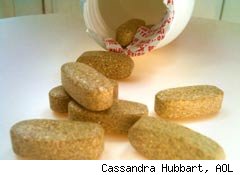Lack of B Vitamin Linked to Depression in Women, Dementia in Both Sexes
 Several B vitamins may be the window to discovering more about the brain's power and functions as well as detecting mental health issues, new research suggests.
Several B vitamins may be the window to discovering more about the brain's power and functions as well as detecting mental health issues, new research suggests.Lindsay Allen, a U.S. Department of Agriculture nutritionist, reports that low levels of the B-9 vitamin, folate, are associated with symptoms of dementia and "cognitive decline" in brain function. Folic acid is the synthetic form of B-9 found in supplements and fortified foods, while folate occurs naturally in foods.
Allen along with scientists from the University of California-Davis, the UCD Medical Center and the University of California-San Francisco collaborated on the long-term research project called the Sacramento Area Latino Study on Aging.
The work began in 1996 with Allen explaining in a news release that studies done before that time were inconclusive and had confusing results. The team's ongoing work now includes about 1,800 Hispanics ages 60 to 101.
Allen tells AOL Health that particularly B-12 deficiency has been very common in developing countries because the only foods you can get it from are animal sources, such as milk, eggs and meet, and many people in poor countries don't consume them.
"But B-12 deficiency is also very common in the elderly U.S. population because they stop being able to absorb it from their diet as they grow older," she says. "We think supplements will work in the elderly because even though they can't absorb it naturally through food, they can through supplements."
Mary Haan of UC San Francisco led the group as they collected blood samples from the volunteers to be analyzed.
From the samples, researchers found that the decrease in brain function in participants with low levels of folate was detectable despite less than one percent of them being deficient.
Researchers also found that women with low folate levels fared worse than men. Women in the bottom third subgroup with a folate deficiency more than doubled their risk for depression, when compared to those in the highest third.
Dr. Laura Corio, AOL women's health expert says folate is also important in women who are trying to start a family.
"Women in their reproductive years need at least one milligram of folate in their system before they try to conceive to decrease their incidence of neural tube defects in their fetus," she tells AOL Health.
That finding provided new evidence of an association between lower blood folate and depression, which is already known to affect brain function.
More on Folate:
Folic Acid (Folates)
Folate Dietary Guidelines
More on Folate:
Folic Acid (Folates)
Folate Dietary Guidelines
http://www.aolhealth.com/2010/08/18/lack-of-b-vitamin-linked-to-depression-dementia